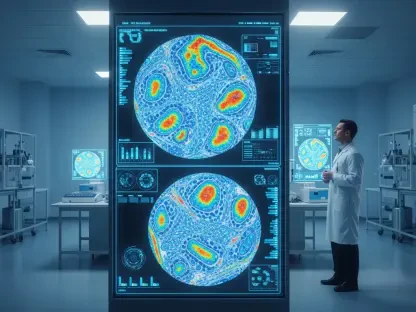In the ongoing battle against cancer, clinical trials remain a cornerstone for advancing new therapies, yet a staggering reality persists: only about 7.1% of U.S. adults diagnosed with cancer currently participate in these critical studies, hampering the pace of drug development. This alarmingly low enrollment rate also restricts countless patients from accessing potentially life-saving treatments. Enter Proscia, a Philadelphia-based innovator in digital pathology, which has unveiled Aperture, an AI-powered platform engineered to revolutionize this landscape. By identifying eligible patients for trials at the precise moment of diagnosis, Aperture promises to dismantle long-standing barriers in recruitment, ensuring that cutting-edge therapies reach those who need them most. This development marks a pivotal shift, merging diagnostic precision with trial enrollment to address one of healthcare’s most pressing challenges.
The Challenge of Clinical Trial Recruitment
Precision Medicine and Recruitment Complexities
The persistent challenge of low participation in cancer clinical trials has become even more pronounced with the rise of precision medicine, where therapies are tailored to specific biomarker-defined subgroups of patients. This shift, while promising, introduces complex eligibility criteria that make matching patients to suitable trials increasingly difficult. Often, the disconnect between diagnostic labs and active studies means that potential candidates are overlooked at critical junctures. Aperture steps into this gap by embedding eligibility assessments directly into the diagnostic workflow. As pathologists finalize their reports, the platform swiftly analyzes a spectrum of data, including pathology images and clinical records, to flag eligible individuals in near-real time. This integration ensures that opportunities for trial enrollment are captured at the earliest stage, significantly reducing delays that have historically slowed progress in oncology research.
Beyond the immediacy of identification, Aperture addresses systemic visibility issues that plague trial recruitment in the era of precision medicine. Traditional methods often fail to connect diagnostic insights with ongoing studies, leaving many patients unaware of relevant opportunities. By automating the process of matching patients to trial criteria, the platform minimizes human error and oversight, creating a seamless bridge between diagnosis and potential treatment pathways. This is particularly vital as cancer therapies become more specialized, requiring precise alignment of patient profiles with study requirements. The result is a more inclusive and efficient recruitment process that could expand access to innovative treatments for a broader population. Moreover, this approach has the potential to diversify trial cohorts, ensuring that research outcomes better reflect real-world patient demographics and needs.
Barriers Beyond Eligibility
Another layer of complexity in clinical trial recruitment lies in the logistical and informational barriers that patients and healthcare providers face. Many patients are not informed about trials due to fragmented communication between medical teams, while others may be deterred by geographic or socioeconomic constraints. Aperture’s design helps mitigate these issues by providing actionable insights at the point of diagnosis, ensuring that trial opportunities are flagged before such barriers can fully take hold. By leveraging digital tools to streamline communication, the platform facilitates a more coordinated effort among pathologists, oncologists, and trial coordinators. This early intervention is crucial for maintaining momentum in the patient journey from diagnosis to potential enrollment, reducing the likelihood of missed opportunities due to systemic inefficiencies.
Additionally, the platform’s ability to operate within existing diagnostic workflows means that it does not require extensive retraining or overhaul of current practices, making adoption more feasible for busy labs. This ease of integration is key to overcoming resistance to new technologies in healthcare settings often burdened by time and resource constraints. Aperture’s focus on real-time data processing also ensures that trial matches are relevant and up-to-date, avoiding the delays associated with outdated or manual systems. By tackling these practical hurdles, the technology not only boosts enrollment rates but also fosters a more connected ecosystem where information flows efficiently between stakeholders. This holistic approach underscores the urgent need for innovation in addressing the multifaceted challenges of trial recruitment.
Aperture’s Innovative Technology
AI and Data Infrastructure
At the heart of Aperture’s transformative potential lies its sophisticated use of artificial intelligence, blending large language models to interpret unstructured text reports with computer vision algorithms to analyze high-resolution pathology images. This dual approach enables the platform to process vast and intricate datasets, often comprising billions of pixels per image, with unparalleled accuracy. Supported by Proscia’s extensive data infrastructure, including the Concentriq platform and a repository of millions of de-identified tissue images, Aperture achieves a scale of analysis that manual methods simply cannot match. This technological backbone ensures precise patient matching to trial criteria by synthesizing diverse inputs like biomarkers, molecular results, and clinical histories, all in near-real time. The result is a powerful tool that turns complex pathology data into actionable insights for trial recruitment.
Equally significant is how Aperture’s robust data pipeline enhances its analytical capabilities, setting a new standard for digital pathology. By de-identifying diagnostic information and integrating it into a cloud-based architecture for standardized querying, the platform handles the inherent variability in pathology reports, such as inconsistent terminology or formatting. This standardization is critical for ensuring reliable outcomes, especially when dealing with the nuanced demands of precision medicine trials. Furthermore, the vast network of linked clinical and genomic data within Proscia’s ecosystem amplifies the platform’s ability to identify suitable candidates across diverse populations. This comprehensive approach not only accelerates recruitment but also lays the groundwork for broader research applications, demonstrating how AI can unlock the full potential of routinely generated pathology data in modern healthcare.
Transforming Diagnostic Insights
The impact of Aperture’s technology extends beyond mere data processing, fundamentally altering how diagnostic insights are utilized in clinical settings. Pathologists, traditionally focused on interpreting slides in isolation, now have access to a tool that ties their findings directly to treatment possibilities and trial opportunities. This shift, as highlighted by Proscia’s co-founder Nathan Buchbinder, positions pathologists as central figures in the patient care continuum, extending their influence into therapy decision-making. By automating the normalization of unstructured data, Aperture empowers these professionals to contribute to patient outcomes at scale, without disrupting their routine workflows. This seamless integration of AI-driven insights ensures that diagnostic reports are no longer endpoints but starting points for broader clinical impact.
Moreover, the real-time nature of Aperture’s matching capabilities ensures that pathologists can act on trial eligibility information when it matters most—during the diagnostic phase. This immediacy prevents the loss of critical windows for enrollment that often occur when data is siloed or delayed. The platform’s ability to distill complex datasets into clear, actionable recommendations also reduces the cognitive burden on pathologists, allowing them to focus on their core expertise while still contributing to downstream care decisions. By bridging the gap between diagnosis and research, Aperture redefines the scope of pathology, aligning it more closely with the dynamic needs of precision medicine. This evolution signals a broader trend in healthcare where technology amplifies the strategic role of diagnostic specialists in improving patient outcomes.
Impact on Pathology Labs and Beyond
Financial and Strategic Benefits
For pathology labs grappling with economic pressures, Aperture offers a lifeline by creating new revenue streams through the identification of trial candidates. Declining reimbursements and persistent staffing shortages have long positioned labs as cost centers within healthcare systems, but this platform shifts that narrative. By integrating trial recruitment into routine diagnostics, labs can generate value that offsets financial strain, transforming their role into that of strategic assets. This economic boost is particularly timely as healthcare budgets tighten, allowing labs to invest in technology and talent without sacrificing operational stability. The ability to contribute directly to clinical research also elevates the profile of pathology departments, fostering partnerships with pharmaceutical companies and research institutions eager to accelerate trial timelines.
Beyond immediate financial gains, Aperture’s strategic benefits for labs lie in its capacity to reposition them within the broader healthcare ecosystem. Labs adopting this technology can differentiate themselves as innovators, attracting collaborations that enhance their influence in patient care delivery. This shift aligns with the growing recognition of pathology as a data-rich field capable of driving therapeutic advancements. Additionally, the platform’s efficiency in matching patients to trials reduces screen-failure rates, a common cost driver in research, further enhancing the value labs bring to drug development. For labs under pressure to justify their budgets, Aperture provides a compelling case for investment in digital pathology, proving that diagnostic workflows can yield tangible returns while advancing the fight against cancer.
Advantages for Drug Development
Pharmaceutical companies stand to gain immensely from Aperture’s capabilities, particularly in the realm of accelerated trial recruitment. By identifying eligible patients at the point of diagnosis, the platform significantly shortens the time-to-first-patient enrollment, a critical factor in the costly and time-sensitive process of drug development. Reduced screen-failure rates—where patients are disqualified after initial screening—also translate into substantial cost savings and more efficient study timelines. Beyond recruitment, Aperture supports broader objectives such as companion diagnostic development, regulatory submissions, label expansions, and payer negotiations, offering a multifaceted tool for navigating the complex landscape of oncology research. This comprehensive support can expedite the delivery of new therapies to market, benefiting both companies and patients.
Furthermore, the aggregated, de-identified data processed by Aperture holds immense potential for observational studies, biomarker discovery, and trial design optimization. While the value of these insights depends on data quality and representativeness, the platform’s vast repository provides a rich foundation for exploratory research that can inform future therapeutic strategies. This capability is especially relevant in precision medicine, where understanding nuanced patient profiles is key to developing targeted treatments. For drugmakers, access to such data-driven insights through Aperture could streamline decision-making processes, from identifying promising research avenues to tailoring trial protocols. This broader impact underscores how digital pathology platforms can reshape not just recruitment but the entire drug development pipeline, driving innovation at every stage.
Ethical and Systemic Considerations
Privacy and Data Governance
A cornerstone of Aperture’s design is its unwavering commitment to data privacy, a critical concern in an era where healthcare data is both invaluable and vulnerable. Participating labs retain full control over their information, ensuring that sensitive patient details are never compromised. Through robust de-identification processes and third-party tokenization for longitudinal tracking, the platform safeguards individual identities while still enabling comprehensive analysis for research purposes. This careful balance between data utility and ethical responsibility reflects a nuanced understanding of the challenges at the intersection of diagnostics and life sciences. By prioritizing governance, Aperture sets a standard for how AI-driven tools can operate responsibly within healthcare, fostering trust among stakeholders.
Equally important is the platform’s approach to navigating the ethical implications of large-scale data use in clinical research. The emphasis on privacy extends to ensuring that aggregated datasets used for observational studies or biomarker discovery adhere to strict compliance standards. This focus mitigates risks of misuse or breaches that could undermine patient confidence in digital health innovations. Additionally, by maintaining transparency in how data is handled and shared, Aperture addresses potential concerns from labs and patients alike, reinforcing the importance of ethical frameworks in technology adoption. This dedication to principled data management not only protects individuals but also enhances the platform’s credibility as a tool for advancing oncology research, ensuring that its benefits are realized without compromising fundamental values.
Digitization Trends in Pathology
The launch of Aperture aligns with a broader trend of digitization in pathology, where the transition from traditional glass slides to digital whole-slide imaging unlocks vast troves of data for analysis. Each digital image, often containing billions of pixels, holds immense detail that can inform both diagnosis and treatment when processed by AI. Platforms like Aperture are uniquely positioned to capitalize on this shift, turning routinely generated data into actionable value for clinical trials and beyond. This evolution represents a significant opportunity to address systemic challenges in oncology research, where the failure to leverage such data has long been a missed chance for progress. The growing adoption of digital tools in labs worldwide signals a future where pathology data drives healthcare innovation on an unprecedented scale.
Moreover, the systemic implications of this digitization trend extend to how healthcare delivery is structured, with platforms like Aperture paving the way for more integrated and data-centric approaches. By harnessing digital imaging and AI, the platform ensures that insights derived from pathology are not siloed but connected to broader therapeutic and research goals. This connectivity is vital for scaling precision medicine, where detailed patient data is the foundation for tailored treatments. As more labs embrace digital workflows, the potential for collaborative research and cross-institutional data sharing grows, promising to accelerate discoveries in cancer care. Reflecting on this trajectory, it’s clear that Aperture’s introduction marked a turning point, demonstrating how past investments in digital pathology laid the groundwork for transformative solutions that continue to shape the future of healthcare.









